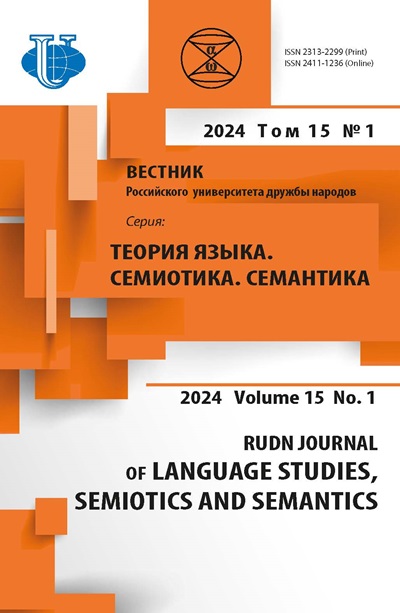PEOPLE’S HISTORY IN THE ORIGIN OF IDIOMS (on the material of the english language)
- Authors: Pasechnik T.B1
-
Affiliations:
- State University of the Humanities and Social Studies
- Issue: Vol 8, No 3 (2017)
- Pages: 630-635
- Section: Articles
- URL: https://journals.rudn.ru/semiotics-semantics/article/view/17024
- DOI: https://doi.org/10.22363/2313-2299-2017-8-3-630-635
Cite item
Full Text
Abstract
The article deals with the question of influence of a phraseological image upon the for-mation of a phraseological meaning in English idioms. The problem posed here is actual as it is caused by a rising interest in modern linguistics to the study of secondary nomination in different languages which is connected with peculiarities of people's verbal thinking and world outlook. The subject of our investigation is the English phraseological units with a fully or partially transferred meaning. The object of our exploration is their semantic peculiarities defined by their motivation or demo-tivation for linguistic and extra-linguistic reasons. The method of the inquiry presupposes to go through a brief survey of some historical facts connected with the origin of English idioms. Our intention in writing this article is to trace the сomplicated interconnection between the meaning of an English idiom and the meaning of a phrase which is considered to be its prototype that can be defined according to A.V. Kunin’s classification as speech, language, outlanguage or mixed. At the level of analysis it is possible to demonstrate the fact that though the metaphor on which the given idioms are based is “darkened”, the expressiveness of such phrases is not a bit less than in idioms with “transparent” metaphors which are felt clearly motivated. On the example of English set phrases an attempt is made to show the way language means reflect the information about the national character in its complexity and variety.
About the authors
Tat’yana B Pasechnik
State University of the Humanities and Social Studies
Author for correspondence.
Email: ptb.65@mail.ru
Pasechnik Tatiana Borisovna, Candidate of Philology, Associate Professor, Associate Professor of the English Language Department, State University of the Humanities and Social Studies; research interests: russian and english phraseology, theory and practice of teaching English
30, Zelyonaya Str, Kolomna, Russia, 140407References
- Kunin, A.V. (1996). A Corse in Modern English Praseology. Dubna: Phenix. (in Russ).
- Kunin, A.V. (Ed.) (2006). Comprehensive English-Russian Dictionary Phraseological Dictionary. Moscow: RusskyYazik Media. (in Russ).
- Solodub, Yu.P. & Albreht F.B. (2002). Modern Russian Language. Vocabulary and Phraseology (comparative aspect). Moscow: Phlinta. Nauka. (in Russ).
- Flavell, L. & Flavell, R. (Ed.) (2011). Dictionary of idioms and their origins. CPI Group (UK) Ltd.













